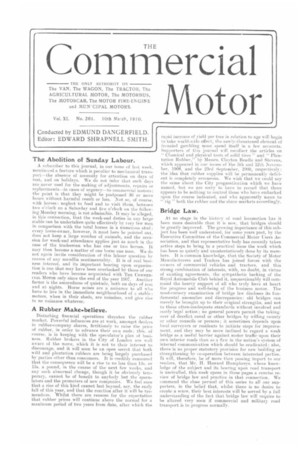The Abolition of Sunday Labour.
Page 1

If you've noticed an error in this article please click here to report it so we can fix it.
A s,lbscriber to this journal, in our issue of last week, mentioned a feature which is peculiar to mechanical tratis port—the absence of necessity for attention on days of rest., and on holidays. We do not infer that such days are never used for the making of adjustments, repairs or replacements—in cases of urgency—to commercial motors : the point is that they might be postponed 36 or more hours without harmful result or loss. Not so, of course, with horses: neglect to feed and to visit them, between two o'clock on a Saturday and five o'clock on the following Monday morning, is not admissible_ It may be alleged, in this connection, that the week-end duties in any large stable can be undertaken quite effectively by very few men in comparison with the total horses in a numerous stral ; every horse-owner, however, it must here be pointed out, does not keep a large number of animals, and the occasion for week-end attendance applies just as much in the case of the tradesman who has one or two horses, it may then become a matter of one horse one man. We do not again invite consideration of this labour question by reason of any maudlin sentimentality. It is of real business interest, and its important bearing upon organization is one that may have been overlooked by those of our readers who have become acquainted with THE COMMERCIAL MOTOR only since the end of the year 1907. Another factor is the assuredness of quietude, both on days of rest and at nights. Horse noises are a nuisance to all who have to live in the immediate neighbourhood of a stable: motors, when in their sheds, are noiseless, and give rise to no nuisance whatever.




















